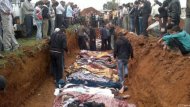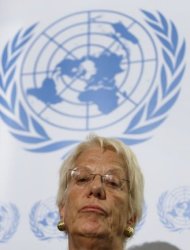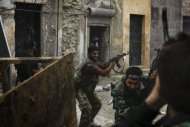UN investigators decry Syria 'war crimes'
An economist who earlier called for a drastic hike in salaries of low-income workers in Singapore has urged the country’s wage council to continue batting for quantitative increases in the workers’ monthly pay for the next two years.
Crimes against humanity are taking place in war-ravaged Syria, UN rights investigators said Thursday as they vowed to identify those behind the atrocities and seek a meeting with Syrian President Bashar al-Assad.
One of the newest members of the four-person team, renowned former war crimes prosecutor Carla del Ponte, told reporters in Geneva that without a doubt "crimes against humanity and war crimes" were being committed in Syria, where Assad's regime has been seeking to crush an uprising that began in March 2011.
Del Ponte, who was yanked out of retirement late last month to join the UN Commission of Inquiry on Syria, said she would participate in the general investigation of tracking and documenting serious rights violations, but that she would mainly focus on determining "the high-ranking political and military figures (responsible for) these crimes."
"As a former prosecutor I can tell you, yes, ... (those) responsible for these crimes should be put to justice," stressed the 65-year-old former chief prosecutor who gained notoriety investigating war crimes in Rwanda and the former Yugoslavia.
Paulo Pinheiro, the Brazilian head of the commission, meanwhile said the investigators had sent a letter to Assad seeking access to the country.
"We expect that he will receive us in Damascus," he said, adding that if investigators were allowed in, they would go without setting conditions.
He acknowledged though that "we don't have a crystal ball. I don't know if he will accept us, but it is our duty to have access."
The commission was created just over a year ago, but has yet to actually gain access to Syria.
It has however conducted more than 1,000 interviews with perpetrators and victims in the conflict, and reported in August that war crimes appeared to have been committed by both the regime and, to a lesser extent, rebel forces.
Pinheiro said the commission aimed to complete a new report by next January.
The commissioners spoke as the world waited to find out whether Assad's regime and opposition forces will indeed heed peace envoy Lakhdar Brahimi's appeal for a four-day ceasefire during the Muslim holiday of Eid al-Adha, which starts Friday.
Brahimi, an Algerian diplomat, said Wednesday that Assad and "most" rebel chiefs had agreed to his proposal, stressing that "if we succeed with this modest initiative, a longer ceasefire can be built" that would allow the launch of a political process.
Pinheiro said such a ceasefire "would be a great accomplishment," rejecting sceptics' claims that it was doomed to fail like the short-lived ceasefire announced by Brahimi's predecessor Kofi Annan in April.
"The fact that the ceasefire was not successful in the past does not mean that there is a spell on any ... ceasefire," he said.
More than 35,000 people, mostly civilians, have been killed since the outbreak of Syria's anti-regime revolt in March 2011, according to the Syrian Observatory for Human Rights.
Del Ponte, who was yanked out of retirement late last month to join the UN Commission of Inquiry on Syria, said she would participate in the general investigation of tracking and documenting serious rights violations, but that she would mainly focus on determining "the high-ranking political and military figures (responsible for) these crimes."
"As a former prosecutor I can tell you, yes, ... (those) responsible for these crimes should be put to justice," stressed the 65-year-old former chief prosecutor who gained notoriety investigating war crimes in Rwanda and the former Yugoslavia.
Paulo Pinheiro, the Brazilian head of the commission, meanwhile said the investigators had sent a letter to Assad seeking access to the country.
"We expect that he will receive us in Damascus," he said, adding that if investigators were allowed in, they would go without setting conditions.
He acknowledged though that "we don't have a crystal ball. I don't know if he will accept us, but it is our duty to have access."
The commission was created just over a year ago, but has yet to actually gain access to Syria.
It has however conducted more than 1,000 interviews with perpetrators and victims in the conflict, and reported in August that war crimes appeared to have been committed by both the regime and, to a lesser extent, rebel forces.
Pinheiro said the commission aimed to complete a new report by next January.
The commissioners spoke as the world waited to find out whether Assad's regime and opposition forces will indeed heed peace envoy Lakhdar Brahimi's appeal for a four-day ceasefire during the Muslim holiday of Eid al-Adha, which starts Friday.
Brahimi, an Algerian diplomat, said Wednesday that Assad and "most" rebel chiefs had agreed to his proposal, stressing that "if we succeed with this modest initiative, a longer ceasefire can be built" that would allow the launch of a political process.
Pinheiro said such a ceasefire "would be a great accomplishment," rejecting sceptics' claims that it was doomed to fail like the short-lived ceasefire announced by Brahimi's predecessor Kofi Annan in April.
"The fact that the ceasefire was not successful in the past does not mean that there is a spell on any ... ceasefire," he said.
More than 35,000 people, mostly civilians, have been killed since the outbreak of Syria's anti-regime revolt in March 2011, according to the Syrian Observatory for Human Rights.




ไม่มีความคิดเห็น:
แสดงความคิดเห็น